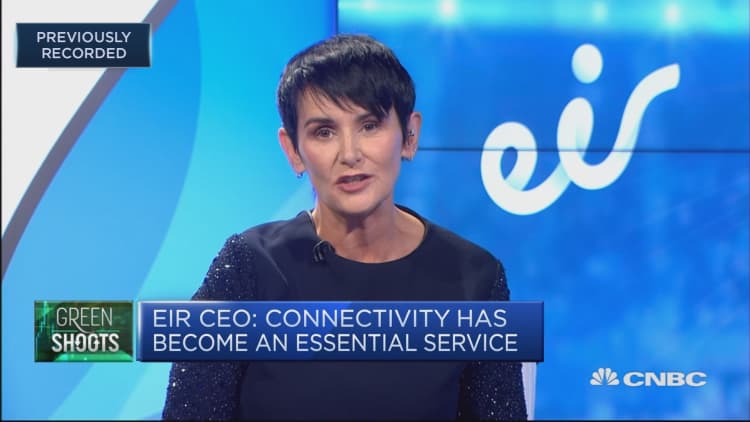
Irish telecoms company Eir has no plans to drop Huawei from its network, saying any changes in the current stance from the European Union would be costly for operators and customers.
Chief Executive Carolan Lennon told CNBC Friday that Eir was confident in the security of Huawei and that the telco will maintain its equipment in parts of its network by following EU recommendations on vetting providers.
In January, the European Commission, the executive arm of the EU, published its 5G "toolbox," which coordinates risk assessments and mitigation across the bloc.
"Effectively that was a coordinated approach to network security so that we would all respond proportionately to any risks in the 5G networks. That includes things like enhanced controls or a dual provider strategy," Lennon said.
Eir uses a mix of providers with Ericsson in the core of its 5G network and Huawei providing the radio access equipment.
"We also manage and monitor our network ourselves with our own staff. We're behind that EU proposal and in that EU proposal there's no recommendation to ban any particular network provider," Lennon said.
The EU position differs from that of the U.S., which has led the charge against the Chinese firm, claiming its links to the Chinese leave nations vulnerable. Huawei has denied the allegations. In July, the U.K. told mobile network operators to strip Huawei gear from its networks by 2027.
Lennon added that should the Commission ever change its stance on Huawei, it would be a costly endeavor for a telco to remove and replace all of its equipment and these are costs that would be felt by the consumer during a time when connectivity has become essential.
"The majority of telcos in Europe use Huawei equipment so that would absolutely slow down deployment of these fast networks just at a time when consumers and businesses need them the most and absolutely drive extra cost to the operators to do that and obviously increase the prices as well," she said.
"We're following the European Commission endorsement of the 5G toolbox and I'm not expecting that to change," she said.
Pandemic response
With the backdrop of Covid-19 challenges, Eir reported a 2% drop in revenues to 1.2 billion euros ($1.42 billion) for the year ended Jun. 30, 2020. But adjusted EBITDA (earnings before interest, taxes, depreciation and amortization) was up 4% to 600 million euros and operating costs were reduced by 7%.
The operator, which is controlled by French telecoms magnate Xavier Niel, is in the midst of a five-year 1-billion-euro investment strategy for expanding 5G coverage and broadband in rural and suburban areas.
Lennon told CNBC that this investment strategy remained on course during lockdown as its engineers were deemed essential services, so work on building out infrastructure could continue.
As people work from home, Eir has seen a 33% increase in demand for fixed broadband and mobile services. Its 5G network has now been rolled out to 21 towns and cities while its chief competitors Vodafone and Three are ramping up their own 5G rollouts.
"From a capacity point of view, across the fixed and mobile network, we haven't been challenged," Lennon said.
"We've seen usage and demand increase by a third and the previous investment in the network meant that the networks were able to cope with that and actually we have some headroom, so if that was to increase again, we can manage that."
There have been challenges in customer service, she said, with a 25% increase in calls to its customer support centers. It moved staff from its three contact centers in Limerick, Cork and Sligo to work from home at the start of the pandemic, which presented issues.
"Sligo in particular is only in place for a year, so basically we were asking staff who had limited experience, maybe a year's experience, to then go and work from home without the support of team leaders and without the support of technical support if there are any kind of issues, and I think that was really challenging for them," she said.




